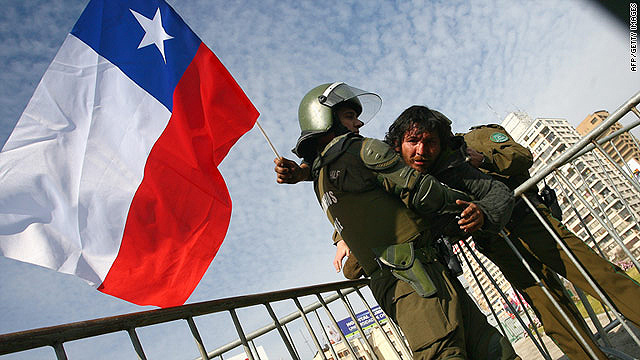By Emilee Gaebler
Impunity Watch Reporter, South America
SANTIAGO, Chile – A growing discontent has spread across Chile as citizens publicly demand reforms from a conservative government. Last Tuesday, protestors called for a “paro nacional” (national strike) on Wednesday and Thursday. Other administrations have confronted 24 hour strikes but this was the first 48 hour strike to occur in Chile since the days of Pinochet’s dictatorship.

Union leaders for Chile’s labor union, The Unitary Central for Workers (CUT), who organized and publicized the strike stated, “[t]his will be the biggest national strike of the last decade.” What began a few months ago, as students’ calling for educational reform, has now segued into a much larger protest against President Sebastian Piñera’s government in general. Demands for equal and quality education across the nation, government position transitions, pension reforms, healthcare reforms and better labor laws are being made.
The strike began on Wednesday morning with a traditional “caceroleo” or pot-banging in the streets. Citizens throughout Santiago stood outside their homes, banging pots as a show of support for the protests. Burning barricades of tires were erected in many of the streets to stop transportation. Police responded with tear gas and water cannons to dispel crowds of protestors. Wednesday and Thursday nights saw spikes in violence, bringing looting of stores and gas stations across the city.
On Friday morning, 16 year old Manuel Gutierrez died from a gunshot wound in the chest that he received during the 48 hour protest. His brother blames the police and the local news reports that he claims the police fired shots into a crowd of protestors Thursday night. Chilean police deny that they used firearms at any point during the conflict.
Chilean government ministers estimated the crowds of protestors at 50,000 and stated only 14% of citizens participated by not working. Union leaders disputed this, saying the government is minimizing the truth. They place the number of protestors at 600,000 and claim 80% of workers refused to work for those two days. The Associated Press placed the number of citizens arrested nationwide at 1,400 and injuries at 200, including both citizens and police officers.
Other protestors have taken to hunger strikes. About 40 students in schools around Chile are striking in this manner. One of them, Gloria Negrete was hospitalized and near death after 37 days of hunger striking in an effort to pressure the government into recognizing demands for educational reform.
Workers at copper mines in Chile are also striking. At BHP Billiton’s Escondida, the top producing copper mine in the world, workers just ended a two week strike that kept tensions high about maintaining the global supply of copper. Workers were asking for a more equitable distribution of the profits from the recent copper boom.
Although Chile’s economy is projected as expanding at 6.6% this year the general populace feels that they are not sharing in the benefits of this prosperity. The current administration’s maintenance of a policy of fiscal austerity and private sector benefits has spurred this sentiment. The strong disparities between the wealthy and economically challenged; combined with a middle class that is not expanding or able to move upwards, make reforms appealing.
Piñera’s current approval rating stands at just 26%, the lowest of any Chilean president since the country returned to democracy in 1990. Since his election, just eighteen months ago, two major reshuffles of his cabinet have occurred. Both were failed attempts to quell the growing unrest in the nation.
On Friday, Piñera finally made a move towards conciliation, “[a]fter more than three months in which we’ve seen violence and conflict flourish, now is the time for peace, the time for unity, the time for dialogue, the time for agreements.” In order to foster discussion Piñera reached out to students, teachers, parents and professors; asking them to participate in education reform talk both at Congress and the Presidential Palace.
Prior to this, Piñera has avoided any direct communications with protestors. The change in his approach and attitude coincides with his 21-point education reform proposal being sent to Congress. However, simply considering education reforms might not be sufficient at this point. Protestor demands have morphed into a call not only for reforms in education but also reforms in healthcare and employment sectors. As well, a more general call has come out of this movement for a more accessible democracy in Chile and an end to the top-down power structure that currently exists.
No final decision has been made by student protest leaders or union leaders as to how they will respond to Piñera’s overtures. The Chilean House President and Chilean Senate President, which represent the left and right wing political parties have offered to sponsor talks but both Piñera and protestors remain cautious and neither has formally agreed to this mediation.
For more information, please see;
The Associated Press – Chile Leader Wants Talks; 1 Dead, 1,400 Arrests – 27 August 2011
CNN – 210 Arrested in Chilean Protests, Government Says – 26 August 2011
San Francisco Chronicle – Thousands in Chile Take to Streets Demand Change – 26 August 2011
The Financial Times Limited – Teen Shot in Chile Anti-Piñera Protest Dies – 25 August 2011
Reuters – Looting, Unrest as Chileans Strike Against Piñera – 25 August 2011
MercoPress – Two-Day Strike Takes Off in Chile with Piñera Increasingly Debilitated – 24 August 2011
MSNBC – Clashes, Disruptions as Strike Begins in Chile – 24 August 2011
The Economist – We Want the World: A Trial of Strength Between Students and the Government – 13 August 2011